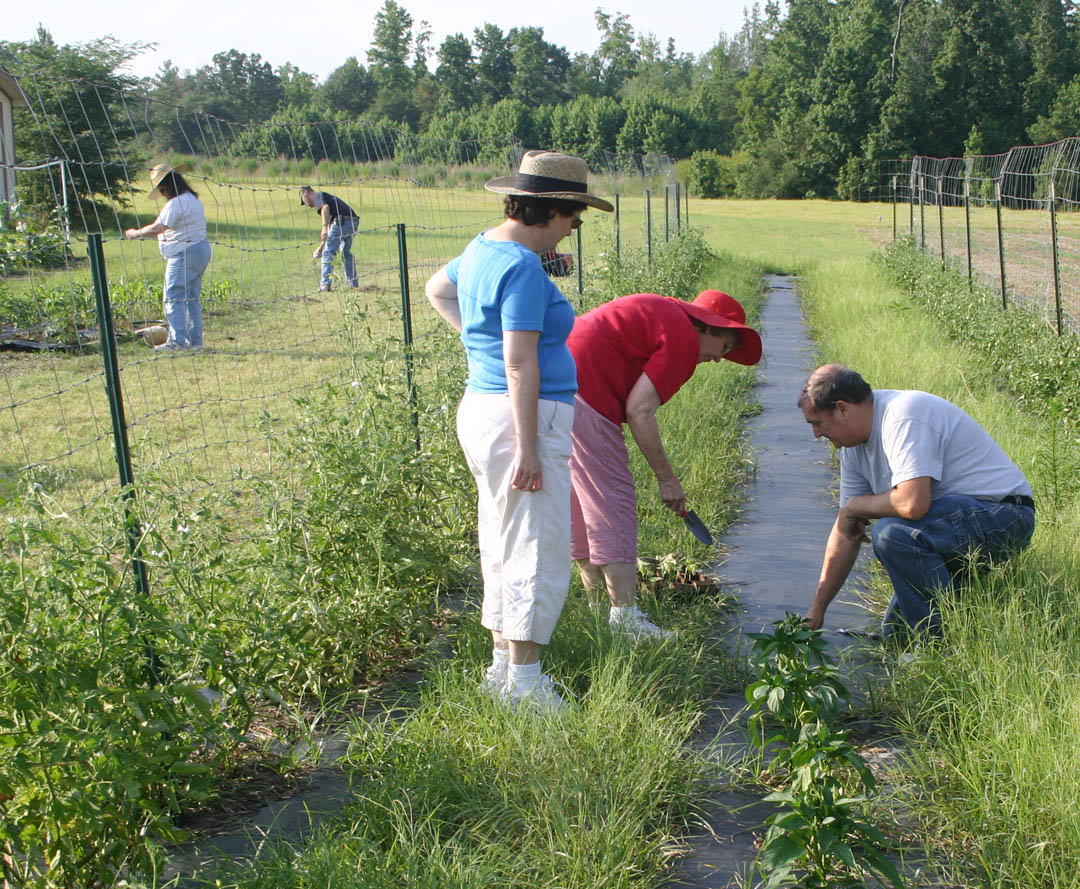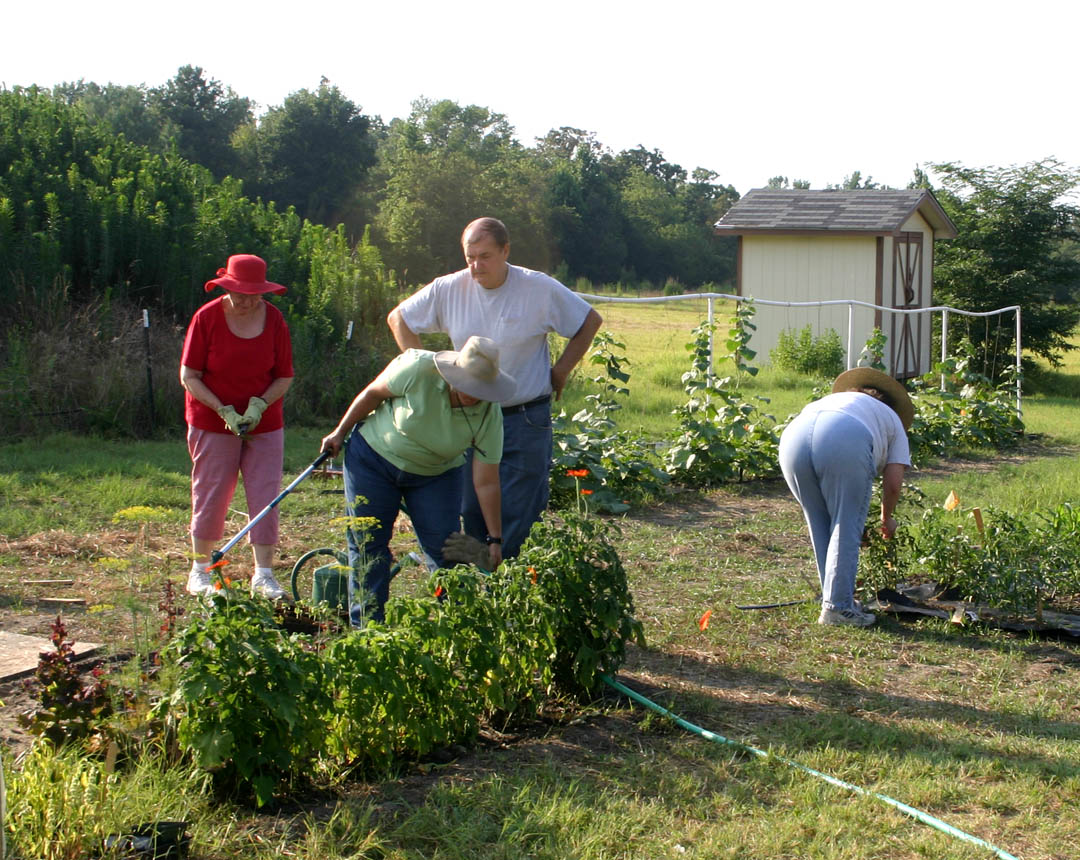College News
Project Skill-UP grant launches ag class at CCCC’s West Harnett Center
Notice: This article is older than 12 months. Names, contact information, programs, titles, etc. might have changed. If you have any problems please call the main college number, 1-800-682-8353, and we will be happy to direct you accordingly.

click image to enlarge ⊗
Students work in the new vegetable production class plot at Central Carolina Community College’s ... (more)

click image to enlarge ⊗
Students work in the new vegetable production class plot at Central Carolina Community College’s ... (more)

click image to enlarge ⊗
Jeanne Beathea, of Sanford, a member of the first vegetable production class at Central Carolina Community ... (more)
07.08.2009 • College & Community • College General
SANFORD - Sustainable agriculture is taking root at Central Carolina Community College's West Harnett Center, thanks to a $40,000 Project Skill-UP grant.
Students in the "Introduction to Sustainable Vegetable Production" course, the first sustainable agriculture class at the Center, are digging, planting, watering and watching over tomatoes, peppers, okra and other vegetables in a field at the Center.
Sustainable agriculture uses methods and supplies that are Earth-friendly, so the students are learning about weed, insect and disease management and prevention without herbicides or pesticides. The class also covers growing herbs and cut flowers, cover crops and crop rotation.
Project Skill-UP, an initiative of the North Carolina Community College System's Continuing Education Division, funds workforce training or retraining for individuals who have lost tobacco industry-related jobs. The Tobacco Trust Fund Commission at the N.C. Department of Agriculture and Consumer Services funds the grant program.
"In many ways, we are on fertile ground," said Stelfanie Williams, vice president of Economic & Community Development at the college. "As farmers and other interested community members pursue greener alternatives, the college can serve as the resource for training and development."
The grant-funded class at the West Harnett Center is a pilot program to train farmers in the skills to transition from tobacco-based farming to sustainable agriculture. The class, taught by Robert VanderVoort, is also open to community members interested in organic gardening. The grant pays for the students' enrollment fees, textbooks and garden supplies.
"We are pleased and thankful that the N.C. Tobacco Trust Fund has sponsored Project Skill-UP at the West Harnett Center," said Bill Tyson, the college's Harnett County provost. "Harnett has a proud agricultural tradition, including tobacco cultivation. The opportunity to develop skills in sustainable farming practices follows that tradition by providing new tools for those with an interest in agriculture on any scale. The community tells us that this is a concept whose time has come and we are proud to be a part of it."
Central Carolina has been a leader in sustainable agriculture education since 1996, when the first class was offered at its Chatham County Campus, in Pittsboro. In 2002, it became the first community college in the United States to offer an Associate of Applied Science in Sustainable Agriculture. It also offers certificates in sustainable vegetable production, sustainable livestock production, and agricultural sustainability, all at its Chatham Campus.
These programs have proven so popular that the college was awarded the one-year Skill-UP grant to begin the expansion of sustainable agriculture education to its West Harnett Center, which serves Lee and Harnett residents.
The goal is to offer a series of classes at the Center that will lead to a certificate in sustainable agriculture. Students will also learn business and technical skills to operate a sustainable farm as a modern small business.
"We anticipate that the program will impact the lives of students who participate, and that they reciprocally can impact their communities through sustainable agriculture," Williams said.
At the heart of sustainable agriculture is the commitment to preserve and improve environmental, public, and community health. It has burgeoned in North Carolina as people increasingly want to eat fresher and healthier food that is grown with minimal or no use of chemical herbicides and pesticides.
With the escalating cost of fuel oil, consumers also want locally grown food, rather than having it transported from thousands of miles away, which also benefits local economies.
For information on the sustainable agriculture classes at the West Harnett Center, call (910) 498-1210. For more information on the college's sustainable agriculture program, go to the college's web site, www.cccc.edu, click on the "A-Z Index" and then "Sustainable Agriculture."
Categories
- Admin, Faculty & Staff Category
- Arts & Entertainment Category
- Clubs Category
- College & Community Category
- College General Category
- Continuing Education Category
- Curriculum Programs Category
- Distance Education Programs Category
- Facilities/Buildings Category
- Finances Category
- Foundation Category
- Graduations Category
- Lee Early College Category
- NCCCS Category
- SGA Category
- Special Events Category
- Sports Category
- Students/Graduates Category
- Uncategorized Category
Archives

